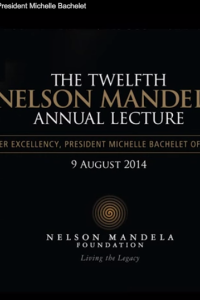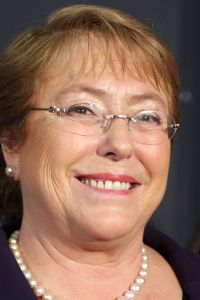Nelson Mandela’s life had been based on a “profound certainty that there are no differences that justify discrimination, violence, abuse or oppression”. He had shown that the only viable path was one of cohesion and unity.
Chilean President Michelle Bachelet delivers her address
This was the view of Chilean President Michelle Bachelet as she took to the podium to deliver the 12th Nelson Mandela Annual Lecture, in the Cape Town City Hall on 9 August 2014.
Bachelet said that, as the first female president of her country (recently elected for a second term), she felt extremely honoured to be giving the lecture on Women’s Day, a “special day for South African women and women around the world”.
She added: “I cannot be part of this event without having present in my memory, my heart and my mind an exceptional, and irreplaceable, man.
At a press conference later, she added that Mandela had been a leader who had been an inspiration to her throughout her life.
“For me, this is a very, very special occasion,” she said.
Bachelet is the second woman president to have presented the Nelson Mandela Annual Lecture following former Irish President Mary Robinson, who took to the podium in 2012.
Other former speakers include Presidents Bill Clinton and Thabo Mbeki; Nobel Laureates Kofi Annan, the late Wangari Maathai, Ellen Johnson Sirleaf, Desmond Tutu and Muhammad Yunus; Professors Ariel Dorfman and Ismail Serageldin; and most recently global philanthropist Dr Mo Ibrahim.
On the stage with President Bachelet were Nelson Mandela’s widow Graça Machel, mayor of Cape Town Patricia de Lille and chair of the Nelson Mandela Foundation, Professor Njabulo Ndebele.
The audience at the Nelson Mandela Annual Lecture
The programme director, actor and playwright Dr John Kani, said at the close that one of the reasons why everyone had loved Mandela was because “he saw himself in us”.
“Nelson Mandela saw himself first and foremost a servant of South Africa’s people, to whom he owed a duty.”
Bachelet’s lecture focused on building social cohesion through active citizenship, with the sub-themes of education and community participation in democracy.
She said Mandela’s life had been based on a “profound certainty that there are no differences that justify discrimination, violence, abuse or oppression”. He had shown that the only viable path was one of cohesion and unity.
Sketching historical similarities between Chile and South Africa’s path to democracy, she said: “It can be said we share a common wound, a common pain, but we also share a sense of common pride.”
She paid tribute to Tutu, who was among the many dignitaries in the audience, for having convened the Truth and Reconciliation Commission, for which there had been a similar process in Chile.
However, she also highlighted the one group in the world who continued to lag behind, namely women. Cultural, economic, social, political discrimination against women remained one of the “most scandalous unequal situations on the planet”.
President Michelle Bachelet, Mrs Graça Machel, Nelson Mandela Foundation chair Professor Njabulo Ndebele, Cape Town mayor Patricia de Lille and programme director Dr John Kani
Among these inequalities were that six out of 10 poor people were women and 75% of women could not get loans from banks.
“As President of Chile, it has been my commitment to make equality between men and women a state objective,” she added.
Elaborating on her government’s pledge to focus on education, she reiterated Mandela’s famous quote: “Education is the most powerful weapon we can use to change the world.”
She drew applause when she said that although Chile had high levels of coverage when it came to education, the challenge was not only to provide access, but also quality.
At the press conference held immediately after the lecture, she also announced that Chile would in 2015 be launching 50 Nelson Mandela scholarships for students from Africa to attend Chilean universities.
She said that Chile also planned to convene a “conversation” involving South Africa, Chile and other Latin American countries going through a transitional justice process so that they could learn from each other.
In his thanks to her, Sello Hatang, CEO of the Nelson Mandela Foundation, thanked Bachelet, saying that if Madiba had been present, he would have been proud.
The Cape Town City Hall at its finest
“You have set the bar very high for all future Nelson Mandela Annual Lectures. For us, this afternoon has been about reflection, memory, legacy. It has been about honouring Madiba.”
He added: “Also fundamental to the legacy of Nelson Mandela is that we must take responsibility for our own liberation. With freedom comes responsibility. This responsibility is not only for us but for the underprivileged, the weak and the wretched.”
The lecture, in the Cape Town City Hall, bears particular political significance as this is where Mandela first addressed South Africans and the world after his release from prison on 11 February 1990 after 27 years in prison. It was also the place where he first spoke to South Africans as their president on 9 May 1994.
This is also the first lecture to be given since his passing away in December last year.
Women's Day commemorates the day in 1956 when 20 000 women marched to the Union Buildings in Pretoria to demand that women not be required to carry passes.


